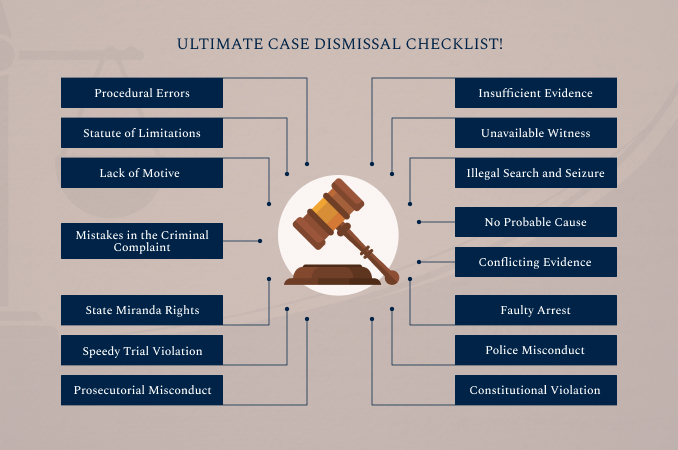
Table Of Contents
- When Is A Case Dismissed?
- ULTIMATE Checklist of Signs Your Case Will Be Dismissed
- Insufficient Evidence
- Unavailable Witness
- Illegal Search and Seizure
- No Probable Cause
- Conflicting Evidence
- Faulty Arrest
- Police Misconduct
- Constitutional Violation
- Mistakes in the Criminal Complaint
- Statute of Limitations
- Lack of Motive
- Procedural Errors
- Failing to State Miranda Rights
- Speedy Trial Violation
- Prosecutorial Misconduct
- What To Do If Your Case Is Dismissed?
- Your Exclusive Rights in a Case
What are the Signs That Your Case Will Be Dismissed?
Understanding the signs your case will be dismissed can bring a sense of relief and hope, especially when you’re caught up in a legal battle that feels overwhelming.
If you have been accused of a crime or are currently in a legal situation, knowing whether the jury will dismiss your case is going to be very beneficial for you! This will let you prepare well.
Although the situation of each case differs, the existence of certain red flags increases the chances of a case dismissal. These include the absence of evidence or infringement of your legal rights.
In this article, I am going to explain what a dismissal is, why it happens, and most importantly, the things that you definitely need to be aware of. You don’t need to have a law degree to understand this.
When Is A Case Dismissed?
A judge decides to dismiss a case when they conclude that the legal procedure shouldn’t be in progress. This can occur due to various reasons:
- The evidence is insufficient.
- Police made errors in the arrest process.
- There was a breach of your rights.
Occasionally, a case might be even dismissed at the pretrial conference stage. This is a meeting that happens before an actual trial. Here, the judge, prosecutor, and defence lawyer talk about the issues of the case.
It is possible that if any serious issues are pinpointed in the process of being handled, the case will be dismissed right then and there.
A dismissal is not an acquittal. It doesn’t mean that you are innocent. It merely means that the case will not proceed in court, often because of the lack of adherence to the law or the case against you is weak.
ULTIMATE Checklist of Signs Your Case Will Be Dismissed

Have you been searching for a comprehensive checklist that explains the signs that may indicate the court might dismiss your case? If yes, then you have come to the right place!
These issues can arise from several factors, such as the police and prosecutors’ poor handling of your case. Additionally, it can also occur due to a lack of legal grounds to proceed.
Here are a few signs that you must know about:
Insufficient Evidence
If the prosecutor doesn’t have enough solid evidence to prove that you committed the crime, your case might be dismissed.
Evidence needs to show beyond a reasonable doubt that you’re guilty. If there are too many gaps or unclear points in the evidence, it weakens the case. No one should face convictions based on guesses or assumptions.
Unavailable Witness
Sometimes, the people who are supposed to testify against you don’t show up in court. There were cases where lawyers could not even locate these witnesses.
If a key witness is missing and their testimony is crucial, the case might fall apart. Without their statements, the prosecution may not be able to prove anything substantial.
Illegal Search and Seizure
To be able to conduct a search or to collect evidence, the police have to follow some specific rules and regulations.
A mere lack of a valid warrant or probable cause to search your property means that their action violated your rights.
Any piece of evidence that they get through this method cannot be part of the case. This leaves the prosecutors with no evidence to proceed with the case. Which, in some instances, may be the ground for the dismissal of the entire case.
No Probable Cause
It is necessary for the police to have a reasonable cause called “probable cause” to stop you. They must stop you or arrest you only on the basis of a valid reason backed by some facts.
Otherwise, the court may decide that your arrest was unwarranted—thus the whole case would be dismissed.
Conflicting Evidence
When the facts of the case do not match, it is very difficult to prove the case. For example, this can happen when one witness is lying, and the other witness tells the truth.
This conflicting information makes it difficult for the judge or prosecutor to make a decision. As a result, the defendant gets an advantage.
If the judge or the prosecutor realizes that the evidence is too contradictory, they may decide to drop the case.
Faulty Arrest
The lack of a proper arrest surely weakens the side of the prosecutor. For example, let’s say that the police have not explained the reasons behind the arrest or have used unnecessary violence.
In such a case, if the police force fails to fulfil the required arrest process, the court can nullify and dismiss the case.
Police Misconduct
This category is causing police to behave immorally in their roles, for example, by telling a lie in their reports, altering the evidence, and using excessive force.
If it is confirmed that there was indeed police misconduct, it can result in a dismissal as the whole case would be seriously affected by the revealed crime.
Constitutional Violation
Everyone has constitutional rights. If the process of arrest violated any of your rights, the judge might decide to dismiss the case.
These rights include the right to remain silent or the right to an attorney. The legal system must respect your basic rights at all times.
Mistakes in the Criminal Complaint
The criminal complaint is the document that officially starts the legal process. If there are errors in it—like wrong charges, incorrect names, or missing information—this can create grounds for dismissal. The law requires that this document be accurate and complete.
Statute of Limitations
Next on the list is the Statute of Limitations. This is basically the deadline beyond which the state cannot cause anyone with criminal charges. If the crime occurred too long ago and charges are pressed after this time, the court will dismiss the case.
Lack of Motive
While the presence of a motive is not always the key element to prove a crime, it is still important. Additionally, it can be a major part of the plaintiff’s side of the story.
If there is no strong reason why you would have committed the crime, this could create reasonable doubt and thus lead to a dismissal.
Procedural Errors
People use legal procedures to guide the administration of justice. If there is a violation of the rules, such as the submission of evidence in the wrong way or the raising of the wrong charges, it may result in acquittal. Such errors can make a trial unfair and, thus, safeguard your right to due process.
Failing to State Miranda Rights
If the police didn’t inform you about your Miranda rights (the right to remain silent and the right to an attorney) when they arrested you, this could be a very serious matter.
Your statement might not be admissible in court. Additionally, the court can dismiss the case if the level of abuse of rights is grave.
Speedy Trial Violation
According to the law, every trial should be just and quick. In other words, the judiciary must complete every trial quickly and fairly within a reasonable time.
Therefore, if there is an unnecessarily long delay in your case, and you have to wait for your rights without any valid cause, then it is possible that your right to a speedy trial might be violated. If so, a dismissal of your case could be granted by a judge.
Prosecutorial Misconduct
This unfair behavior of the prosecutor is about keeping clear of the evidence. They can do a number of things, for example, make threats to the witnesses, or mislead the court.
If at all, such a thing is noticed, it can result in the case being stopped since the case is indeed dishonest.
What To Do If Your Case Is Dismissed?
If the court dismissed your case because of some of the reasons that I have mentioned above, don’t think that it’s over! You see, the prosecution still has the right to refile charges.
Here, it’s critical for you to consult a criminal lawyer to get the meaning of dismissal in your particular situation.
It happens that a termination has the notion of “with prejudice” articles, so that’s the end of the case. On other occasions, it’s “without prejudice,” which implies that the plaintiff is at liberty to resume the case.
Firstly, an attorney can save you from further incidents, eliminate criminal charges from your past, and tell you the status of your matter, if necessary.
The most important thing is that you still have the right to talk to a lawyer, even if a dismissal took place.
Always check in with someone who understands the law.
Your Exclusive Rights in a Case
In conclusion, at the core of each case is a human being with rights. It may be that you or someone you care about is that person.
There is no such thing as a perfect justice system. Therefore, t is only obvious that mistakes will most definitely happen.
However, knowing what are the signs your case will be dismissed will help you protect yourself, your rights, and your case. If it’s a mistake, this alone should not ruin your life.
Anyone who has been the victim of incidents such as poor evidence, missing witnesses, or being forced to give their right, should be able to tell their story.
Additionally, they should demand an unbiased review of their case, no matter what social status or level of education they are at.
And yes, if there is one thing that you must always remember, it is this: No matter what your racial background, your income level, and your status in life, it is your human right to stand up for the issue, question it, and demand truth and fairness.
Read Also:









